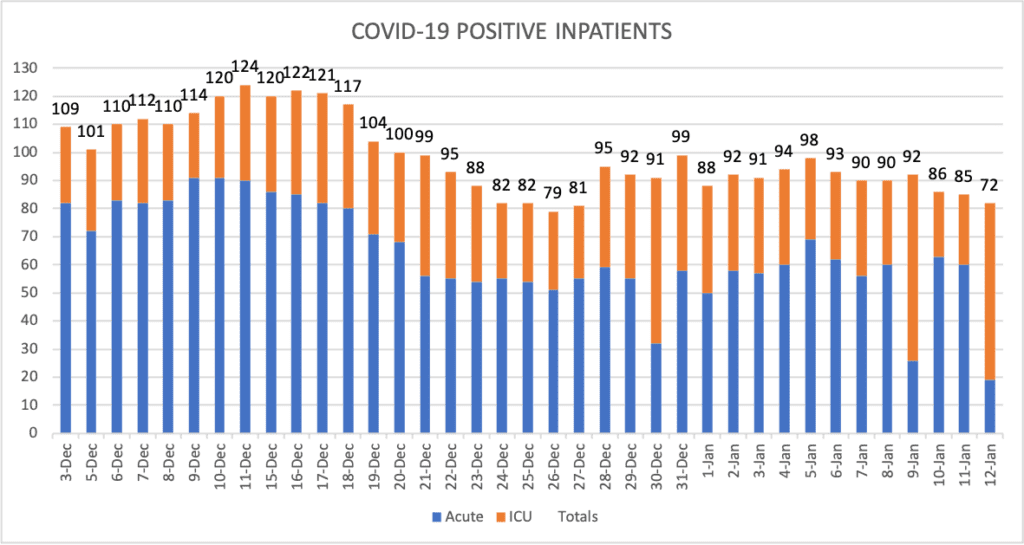Data Snapshot
UW Medicine Hospitals:

King County: The county reported 716 new positive cases and 1 new death on Jan. 11.
Washington: The state reported 265,312 cases and 3,699 deaths as of Jan. 10.
United States: The CDC reports 22,322,956 cases and 373,167 deaths as of Jan. 11.
Global: WHO reports 89,416,559 confirmed COVID-19 cases and 1,935,028 deaths as of Jan. 12.
*Numbers update frequently, please follow links for most up-to-date numbers.
UW Medicine COVID-19 Vaccine Distribution Update
Total Vaccinated: 20,490
· Employees: 15,210
· Community Members: 5,280
COVID-19 Literature Report
COVID-19 Literature Situation Report is a daily (M-F) newsletter put together by the Alliance for Pandemic Preparedness that provides a succinct summary of the latest scientific literature related to the COVID-19 pandemic.
Key Takeaways: COVID-19 Literature Situation Report Jan. 11, 2021
- Among collegiate athletes exposed to COVID-19 (n=1,830), one quarter had positive test results during quarantine with a mean of 3.8 days from quarantine start until the positive test result. More.
- In the St. Louis region, 89,341 SARS-CoV-2 tests were conducted in 23 zip codes accounting for 50% of hospitalizations, and 17 of these zip codes had a population where >50% of residents were Black. In contrast, 218,057 tests were conducted in 86 zip codes accounting for only 25% of hospitalizations, none of which had a predominantly Black population. More.
- A prospective, randomized, open-label trial concluded that renin–angiotensin system inhibitors, which are medications commonly used to treat hypertension, could safely be continued in patients hospitalized with COVID-19. More.
- A rapid review and meta-analysis concluded that three quarters of COVID-19 patients received antibiotics, significantly higher than the prevalence of bacterial co-infection (8.6%). More.
COVID-19 Literature Surveillance Team, is an affiliated group of medical students, PhDs and physicians keeping up with the latest research on SARS-CoV-2 / COVID-19 by finding the newest articles, reading them, grading their level of evidence and bringing you the bottom line.
Read the latest report: Jan. 11 | Daily COVID-19 LST Report.
Listen to the latest podcast: Jan. 4 | COVID-19 LST Podcast.
UW Medicine in the News
KING 5: Seattle’s COVID-19 self-testing kiosks run risk of false negatives, FDA warns
Featuring: Geoffrey Baird, Laboratory Medicine
“In December, the City of Seattle announced the arrival of three COVID-19 testing kiosks created by the company Curative. They’re convenient and easy to use. You make an appointment online, walk up, swab your own mouth and in about 48 hours, Curative tells you if your test came back positive or negative. But now the FDA says those results may not be as accurate as you’d think. ‘What has to be said is: right now, we have reason to believe that these tests actually may misidentify positives as negatives,’ said Dr. Geoffrey Baird, the Interim Chair for the Department of Laboratory Medicine & Pathology at UW Medicine. It has to do with Curative’s use of mouth swabs instead of that infamous deep nasal swab typically used in COVID-19 testing, according to Baird. ‘It does look like those types of swabs, so the oral, or the throat swab are just lower in sensitivity, that means they’re more likely to miss a true positive if it’s in fact there,’ he said. ‘Coronavirus, it seems to like to hang out in the back of the nose and so that seems to be the best most, sensitive area for us to pick it up if it’s there.’”
MyNorthwest: Patients encouraged to report side effects of COVID vaccine through app
Featuring: Keith Jerome, Laboratory Medicine
‘“When you get vaccinated, you should be offered the opportunity to download an app that was basically made by CDC, the Centers for Disease Control, and essentially, what the app does is it asks you to put in your phone number and says, ‘do you mind if we text you once a day for the next week and then occasionally thereafter, just to find out how you’re doing with the vaccine?,’’ Dr. Jerome explained. He says he did it, and received a text asking how he was feeling, with boxes to check, asking if you had a sore arm, if you had to miss work. He says he had a sore arm two days after the shot, but nothing else. ‘It takes about 45 seconds, and then they say thank you and you’re done,’ he said. ‘So the more people who participate in that, the more we’ll know if there are rare troubles with the vaccine. Right now, it seems to be really well tolerated. It sounds like people more often have a reaction to the second dose where they feel tired, some people have to stay home from work just with fatigue that day and, again, those sort of body aches, [but] that’s a sign that it’s working. So you want to see that, actually.”’
KING 5: Severe allergic reactions to COVID-19 vaccines are extremely rare, says the CDC
Featuring: Doug Paauw, General Internal Medicine
“Adverse reactions aren’t common at all, according to a recent study by the CDC. In a study of the Pfizer vaccine given between Dec. 14 and 23, out of 1,893,360 doses, there were 4,393 adverse reactions or 0.02%. The reactions included skin rash and itchy throat. Only 21 people in the group suffered severe reactions, including anaphylactic allergic reactions. All of those people recovered. Doctors with UW said we do not need to worry about an allergic reaction. ‘I would put it this way, we take medications every day that our physicians prescribe for us and they have a much greater reaction than the COVID-19 vaccine,’ said Dr. Doug Paauw, UW Doctor of Internal Medicine. ‘A lot of patients ask, ‘Well I’ve had some allergies to this and that, I really should not take this.’ And that is not the case.’ Even people with allergies to medications shouldn’t be concerned, according to Paauw. ‘Short of a reaction to polyethylene glycol, which is one of the carriers in it and a known proven allergy to that, that’s really the only thing that would give somebody a reason to withhold the vaccine,’ he said. To put it plainly, Paauw said, you’re much more likely to die of COVID-19 than of having a severe reaction to the COVID-19 vaccine.”
Tweet of the Week
Latest look at hospital capacity in King County. @UWMedicine hospitals not surging, according to data. https://t.co/p5wrvTJSpC
— UW Medicine Newsroom (@uwmnewsroom) January 11, 2021
